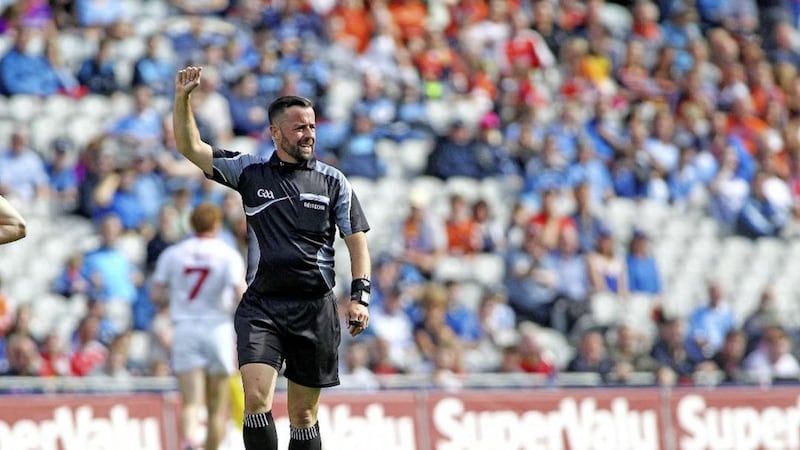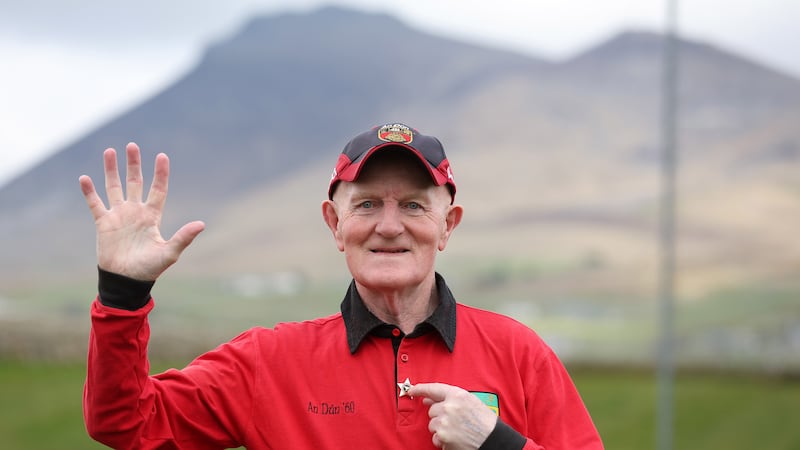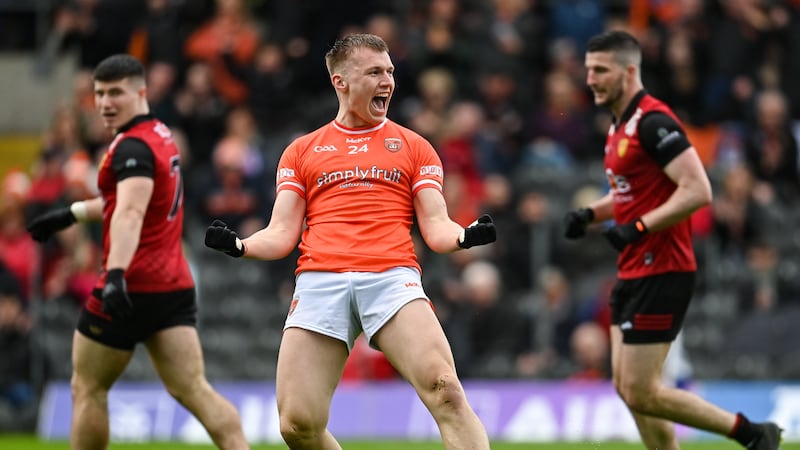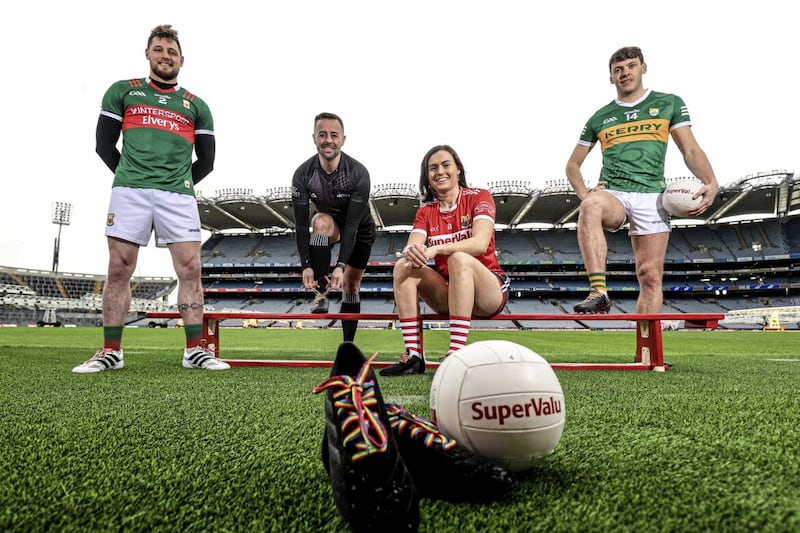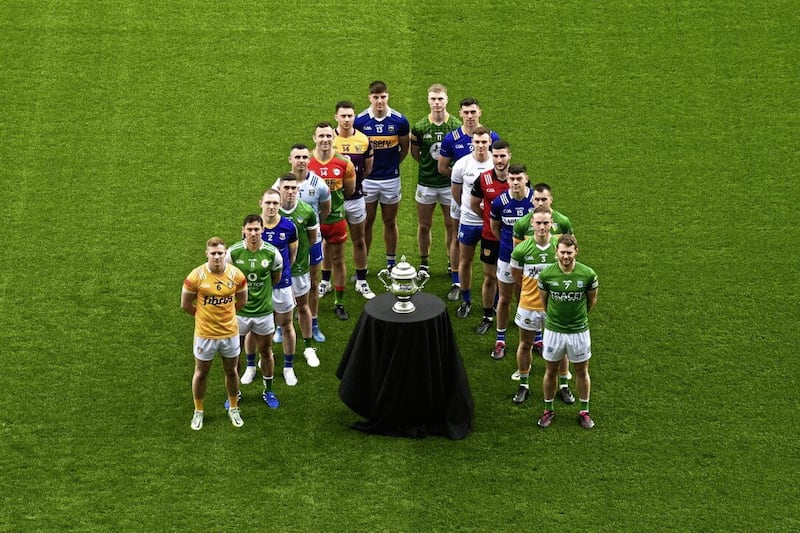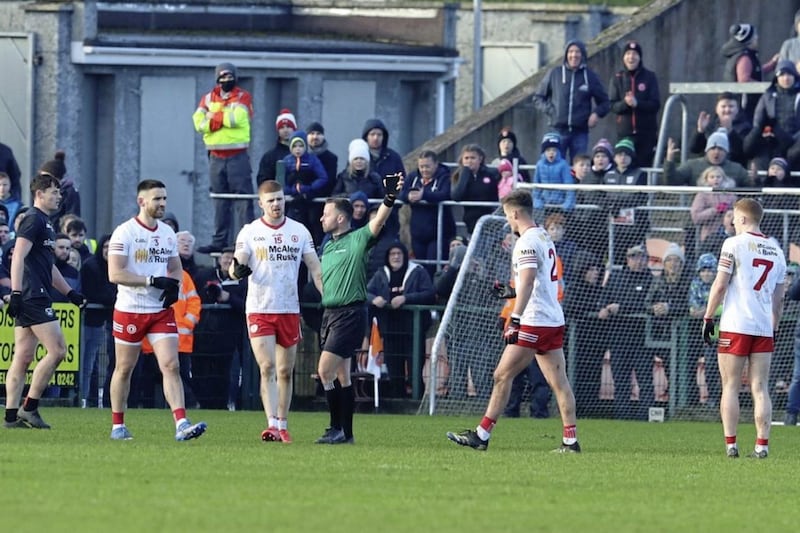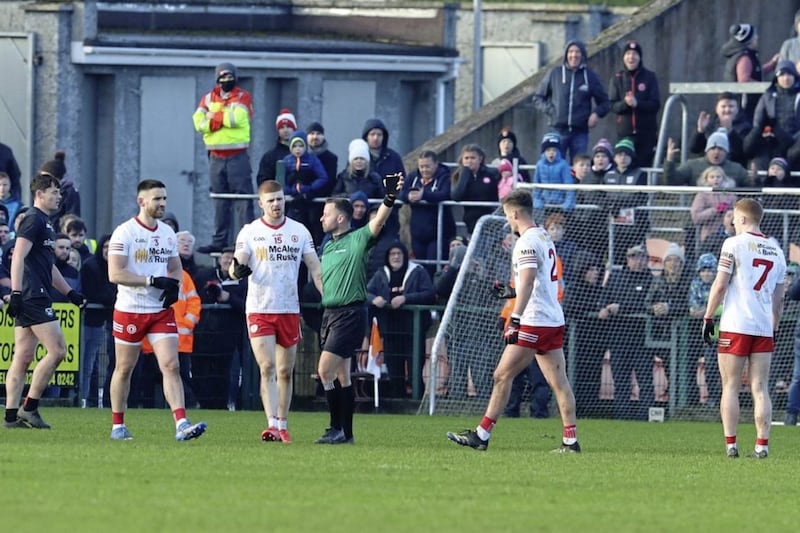It is 10 years this week top GAA referee David Gough announced to the world he was gay. In a searingly honest interview, he tells Brendan Crossan about the path he's travelled and the sense of freedom he's felt since his announcement...
TEARS flowed and spilled onto his lap as he read the poem. You don’t plan tears. Not like this. Alone, in an empty classroom on a Friday afternoon.
John O’Donohue’s masterpiece ‘For the Time of Necessary Decision’ took him completely by surprise. It was as if the last verse was written for an audience of one that day.
On Friday January 29, 2011, the poem was dedicated to David Gough, 27-years-old, from Slane Co Meath, teacher, footballer, tennis player, referee, GAA man. And a gay man who was grappling with his sexuality like an unwanted secret.
‘May we have the courage to take the step / Into the unknown that beckons us / Trust that a richer life awaits us there /
That we will lose nothing /But what has already died / Feel the deeper knowing in us sure / Of all that is about to be born beyond / The pale frames where we stayed confined / Not realising how such vacant endurance / Was bleaching our soul’s desire.’
“As it happened, that January, when I was looking for a reading to do at my aunt’s humanist wedding, I was sitting in the classroom teaching special needs children at the time and the child who had autism had gone to the psychologist for the day and I’d the last 30 minutes of the Friday afternoon free,” Gough recalls.
“And as I was looking through John O’Donohue’s book I came across this poem and by the time I’d finished it, there were tears streaming down my face. It was very emotional.
“It could have been written for me, in my particular circumstances. I had lost any sort of passion I had for my whole life. I had thrown myself into my work, my sports, committees within the GAA, so I didn’t have to think about my sexuality or deal with it.
“I felt there was nothing alive for me anymore. I was existing, I actually wasn’t living… It was just the hope in the last verse where O’Donohue says, ‘May you have the courage to take the step into the unknown…’
“And that’s what I needed, I needed that courage just to make that step knowing that something great was going to lie beyond for me, if I could just take the step...
“It was the moment where a gay man says: ‘I can’t do this anymore. I have to change or I’m just going to be living this horrible existence for the rest of my life.’
"That was the actual moment that the decision was made.”
Two days later, he told his family he was gay. With the considerable help of an Irish poet, David Gough was no longer carrying the weight of the world in his own head. He was liberated.
******************
IN the white heat of Championship Sundays, when all around him are losing their heads, David Gough is invariably a paragon of calm. The Meath referee never discriminates among the on-field protesters. He affords each player the same firm respect.
“I could be the most relaxed, calm character with 80,000 people in Croke Park and it wouldn’t cost me a thought.”
But an entirely different, cantankerous character often revealed itself when he trained with his team-mates.
“I was dreadfully unhappy for about four years before I told my parents,” Gough says, who this week celebrated his 10th anniversary of 'coming out'.
“I was argumentative, short-fused, ill-tempered, uneasy, difficult to deal with, and that was because I wasn’t able to accept that I was gay. I decided to blame everything and anything other than myself, and there were moments in training sessions with the team where I had a massively short fuse and if I didn’t believe what the manager was doing I let him have it. And my friends would be saying: ‘Who does Roy Keane think he is over there?’”
Gough was a solid corner-back with his club Slane. He was on the St Pat’s Navan panel alongside his brother that claimed the Hogan Cup in 2001.
At St Patrick’s College, Drumcondra he won a Trench Cup and played alongside the likes of Rory Kavanagh, Brian Kavanagh, David Henry and Kilkenny hurling duo David Herity and Richie Hogan both of whom dabbled in the big-ball game.
Gough was the only player out of the back six of that Trench Cup winning team who didn’t represent their county at any level.
Gough loved GAA but he was equally passionate about tennis and had already pursued a career in umpiring.
“That was the route I was going down.”
He’d stumbled across officiating Gaelic football matches while studying at Drumcondra, which is now known as DCU St Patrick’s Campus.
A primary school game was due to start at the back pitch but the referee didn't show. Thomas Fitzpatrick, who was Games Development Officer at the college, threw Gough the whistle to referee the game.
It turned out Fitzpatrick was training the likes of Pat McEnaney, John Bannon, Brian Crowe and Brian Gavin in Croke Park. After the game Fitzpatrick encouraged Gough to consider taking up the whistle and got him a few more matches to referee.
By the end of 2007, Gough was fully qualified and began refereeing the following year.
The Meath native stepped up to the inter-county circuit in 2011. His first game was an O’Byrne Cup match between Offaly and UCD.
******************
IT’S the spring of 2015. The year of Marriage Equality in the south and the winds of beginning change.
And here he is. Posted to Cashel to referee a Division Three dead rubber between Tipperary and Wexford.
This was the GAA’s crude way of telling one of their up and coming refereeing stars who’s boss.
His wearing of the rainbow wristband a couple of weeks earlier outside Croke Park and the intense media fall-out created a massive headache for the GAA.
With the Marriage Equality referendum only a couple of months away, the Association’s top brass refused Gough permission to wear the rainbow colours in the National League game between Dublin and Tyrone.
If word of David Gough’s sexuality hadn’t seeped out already, the dams well and truly burst when his image, proudly wearing the rainbow colours, was plastered all over the front page of The Sunday Independent.
Gough thought long and hard over his public declaration of support for the 'Yes' campaign in the upcoming 2015 referendum. He spoke to a number of gay friends, all of whom gave him their backing.
“The GAA permeates every aspect of society right across the island. It wasn’t just a Dublin referendum,” Gough reasoned at the time.
He rang John Greene, sports editor of the Sunday Independent, who happened to be chairman of Gough’s club Slane.
‘Jesus, I don’t know if this is a great idea. I’ll call you back,’ Greene said.
Greene rang his club-mate back.
‘David, I’m not sure if you should go ahead with this.’
Gough replied: ‘John, I’m not asking you for permission, I’m asking you if you want the story.’
The article was actually written a week in advance. But the GAA plates were moving as the top brass got wind of Gough’s intention to wear a rainbow wristband.
When he’d spoken to three high-profile people in the GAA in the lead-up to the game, their advice was emphatic.
“They all said: ‘Don’t do it. This will endanger your refereeing career. It’s a bad move. You don’t want to take on the GAA…’
“My thinking on it was they were looking out for me because they didn’t know what to expect, they had never dealt with something like this before and they were looking out for my welfare and my needs. And they actually knew the potential that I had to become the referee that I have now become and they didn’t want to see anything getting in the way. That’s being honest about it.”
The behind-the-scenes diplomacy was ramped up.
‘You can wear the wristband in the changing room.’
‘No,' said Gough.
‘You can wear it in the dressing room but you have to take it off before entering the pitch.’
‘No.’
And so it went. On the morning of the game, Gough received a phone call from a high-ranking GAA official explaining they simply weren’t happy with him wearing the wristband on the grounds that it could be interpreted as the Association taking sides in the referendum debate.
“I said: ‘That’s fine. But you’re going to have to deal with the fall-out of this as I have my story done with The Sunday Independent.’
“Rather than being a small story in the sports section of the newspaper, it ended up on the front page of the news section the following morning.”
Gough was photographed outside Croke Park displaying his wristband because he was banned from wearing it inside the stadium.
So here he is in Cashel in early April. Banished to the backwaters of Division Three for his sins. It couldn’t have been further away from the bright lights of Croke Park only a few weeks earlier.
“I had never refereed a game as low in the League and I still haven’t,” Gough says. “I’d a job to do and I didn’t approach it any differently to the Dublin-Tyrone match. It was just disappointing that this message was being sent to me through my appointments. But it didn’t take long as my performances spoke for themselves.
“It was a real slap on the wrists. I was told by someone else within the GAA not long afterwards, to ‘put the wristband away and never be seen again.’ That was frightening and it took me a long time after 2015 to go back to the GAA to say: ‘Look it, this needs to move on.’ “
Marriage Equality, of course, won by a landslide. Ireland had changed. And so too would the GAA.
Of course, there was also school to consider. Gough was absolutely loving his teaching job in St Pius X, Terenure. Technically speaking, Gough revealing he was gay contravened the Catholic ethos of the school and he could therefore face dismissal. The discriminatory legislation has since been binned.
“Luckily, I had a very strong board of management at the time,” he says. “The current Chief Medical Officer, Dr Tony Holohan, was sitting on that board of management and he was fulsome in his support of me in what I was going to do in 2015.
“There was never any fear of me being let go because he supported me and my teaching. What was lovely was going back into school on Monday morning following the wristband story, the amount of parents that arrived at the door of the classroom to offer their support.
“They had flowers, cards and baked cakes… It was very emotional and some of the letters that were written by parents the following week were magnificent. For a school that had 520 children there wasn’t one complaint from any parent and I will always remember the school community for that.
“And the children themselves had all been made aware of it. They knew their teacher was front page news on the Sunday, and every Monday morning we would talk about what news we had – they played soccer at the weekend, or they scored two goals or that they had been to the park. There were a couple of funny comments too.
‘Well, what did you get up to at the weekend, Mr Gough.’”
He laughs at the children’s innocent mischief.
******************
DAVID Gough’s life is framed before and after his announcement he was gay.
Freedom often comes in very simple forms.
For him, there was one moment above all others where he knew the shackles of the past were well and truly shed.
It was 2012, before people outside of Slane knew who he was.
“I was walking down Grafton Street with my partner in 2012 and holding hands with him. That was big for me at the time. I’d never held hands in public with another man. It was so comforting that no-one batted an eyelid, it didn’t matter to them.
“Those small things that people take for granted were huge moments for me in my life; intimate moments that I could never have experienced before 2011.”
John Horan’s presidency, Gough reckons, was the real game-changer. He got to know the Dubliner and his wife during a European trip to Maastricht.
As soon as Horan took over he didn’t need any persuading to open the GAA’s doors to the gay community and illustrated this by attending the 2019 Pride Parade in Dublin along with Gough’s parents.
“John and I became good friends. When he became President, I had the opportunity with Valerie Mulcahy (who announced she was gay in January 2015) to have a chat with him. Everything changed.
“As we left the office I put my arm around Valerie, just to give her a hug and to say ‘Well done, at least we tried’. John tells the story about looking at us from behind and that we could have been a usual couple leaving his office, but that he saw was two people who were struggling without the support of the Association. And he made the decision himself, a Presidential decision, no committee within the GAA ever backed it and no-one was ever put in the Pride Parade.”
Gough, who now works as the GAA’s Education and Games Development Officer in St Patrick’s Teacher Training College, says the Association has come on “leaps and bounds” over the last number of years having appointed a full-time diversity and inclusion officer as part of their modernisation.
But, societally, there is still some road to travel to escape the clutches of centuries of “toxic masculinity”
“It’s about a culture change and driving that culture change, and these attitudes towards gay men in sport – they are learned attitudes. Homophobia is a learned attitude; it’s not something you’re born with. And, therefore, through education, it can be unlearnt. When people start to come into our world, nobody has to come out.”
He feels his story, his journey over the last 10 years has humanised him among the GAA community, and that players, managers and supporters perhaps cut him a bit more slack during games.
“When you’re at your most tired and you’ve ran the length of the field because there’s a break in play and the blood is going everywhere but the brain, where you need it to go to make informed decisions, it’s a really difficult skill and people take it for granted how difficult it actually is to perform at the highest level. But it is a challenge and one that I love taking on.”
Despite being at the top of his game, he still feels he has a bit more to prove every time he takes to the field to referee a game.
“Some males think that because this person is gay they are somehow weaker or lesser than, or not able to perform at the same level. It’s that which wants me to prove them wrong. I’m so comfortable in my own skin that I’m able to perform as well as anybody else on any given day.”
